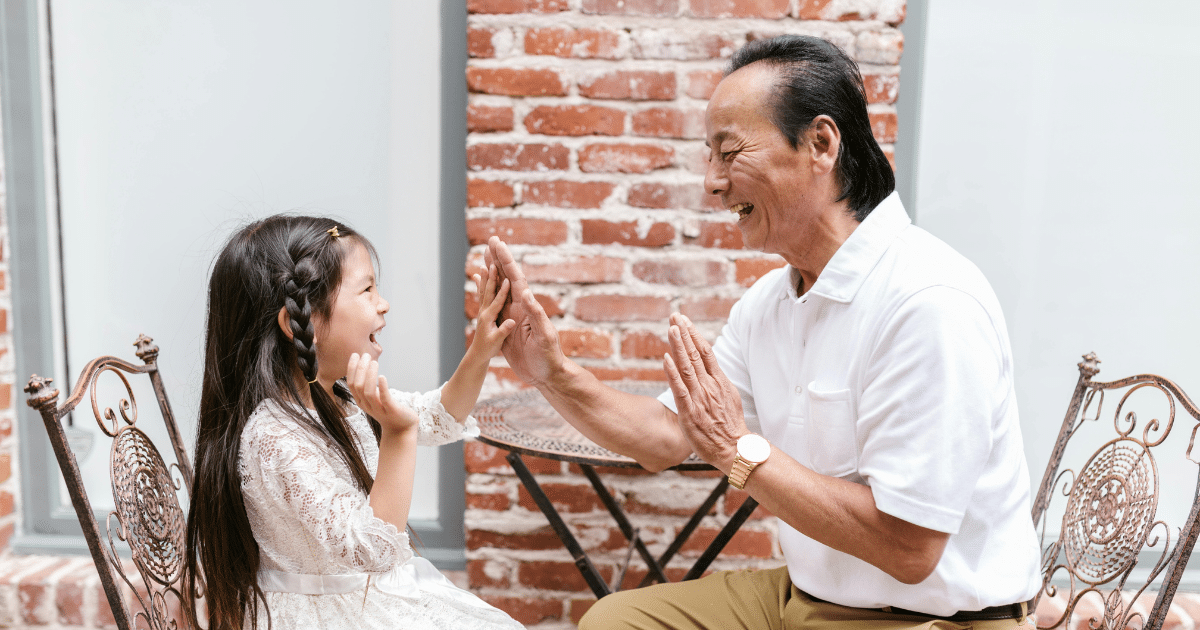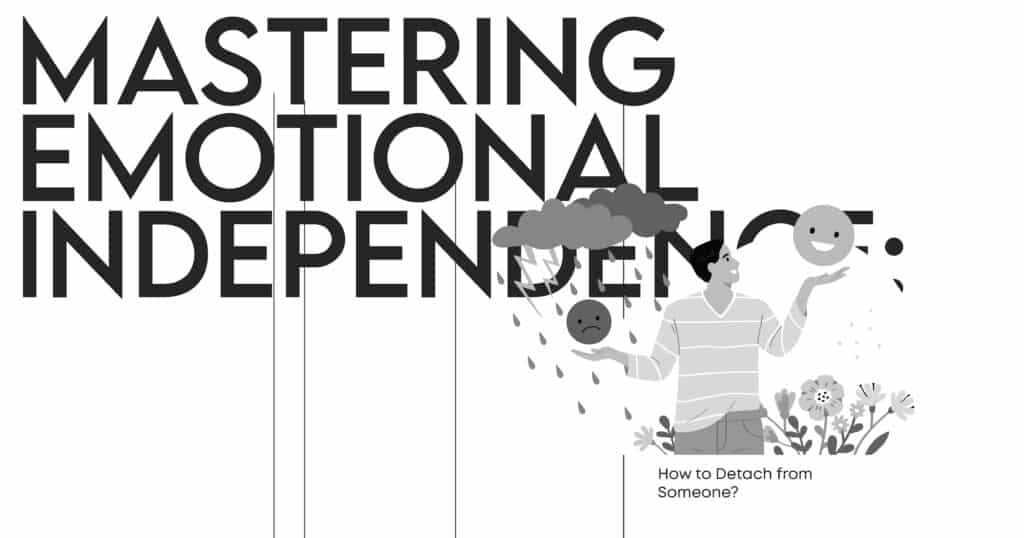Being in touch with your emotions is generally seen as a positive thing but sometimes the healthiest thing you can do for your present and future is to emotionally detach. How can emotional independence facilitate your personal development? And how to detach from someone as you find the strength to let go?
In this guide we will take a closer look at emotional independence and the benefits of emotional detachment, figure out how you can move on towards a more fulfilling life, and discover how the ability to regulate your emotions can improve your mental wellness.
Emotional Detachment: A Guide to Letting Go and Moving On
Emotional detachment refers to the ability to take a step back and acquire an objective view of your emotions as you approach your past and present experiences with clarity and balance.
When you can let go of the person who hurt you, leave the job that stifles your creativity, and stop investing your time, money, and effort into an activity or project that leads nowhere, you can reduce stress and anxiety, enhance emotional resilience, and begin a healing process – navigate the ups and downs of life with greater emotional intelligence and ease.
Nashville Mental Health
The Importance of Emotional Detachment for Personal Growth
You can take your personal growth to the next level if you practice healthy emotional detachment – accept the things you cannot control, recognize limitations and obstacles you cannot currently tackle and overcome, practice acceptance, and acknowledge that you cannot predict tomorrow.
A journey of personal growth is rarely an easy one but if you concentrate your attention on goal setting, define boundaries for yourself and others, prioritize healthy habits to safeguard your body and mind, and learn to celebrate your achievements as your progress continues, you can accomplish your objectives.

Understanding Emotional Detachment and Its Role in Self-Care
In case you are trying to move on after a painful break-up or your relationship with a family member or friend causes nothing but grief and anxiety, emotional detachment can come in handy. You shift your attention inward, set boundaries for future communication with the person in question if you still have to remain in touch with them, and prioritize your own well-being over someone else’s for once.
Setting Healthy Boundaries to Foster Emotional Well-being
As you learn what kind of person you are on your own, you can protect your emotional and mental health by establishing boundaries – keep them private and share them with your loved ones whenever it is necessary:
| Boundary | Description |
| Know Your Limits | It helps to reflect on behaviors, demands, and situations that drain your energy and make you mentally fatigued – you can be less overwhelmed and uncomfortable if you already know what makes your life harder |
| Stay Consistent | Sticking to your boundaries can be hard especially when it comes to interpersonal relationships. Do not give up and stand your ground – the limits are there, and everyone including you must respect them |
| Practice Assertiveness | You can learn to be more assertive – it is an acquired skill. Say “no” when you disagree with someone or want to decline an invitation – advocating for your needs without hesitation and guilt is an essential boundary to have |
| Communicate Clearly | When you are letting other people know about your boundaries and limits, the right course of action is to speak directly – use “I statements” to speak to your family, friends, and colleagues |
| Look for Guidance | In case you struggle to establish or maintain boundaries, talking to a mental health specialist who can provide you with the support you require during tough times can be the right solution |
The Healing Process: Strategies for Letting Go
How to detach from someone you loved and cared about? While some people believe it is less challenging to go through it with grief and sadness, others thrive with the help of emotional detachment. See how you feel when you redirect your energy towards self-improvement, try new hobbies and activities you have been postponing for a while, and engage in self-care whether you want to focus on your emotional well-being or put emphasis on physical wellness.
Mindfulness Techniques to Support Emotional Detachment
Even on your own you are able to cultivate emotional detachment – mindfulness has already helped numerous individuals who want to take care of themselves. Here are just a few practices you can incorporate into your daily life:
| Technique | Description |
| Meditation | Mindful meditation will allow you to observe your feelings and thoughts without judgment or attempt to regulate them |
| Breathing Exercises | Ground yourself in the present moment and imagine you are separate from your emotions – diaphragmatic breathing, for instance, can stimulate your nervous system and restore balance in your body and mind |
| Journaling | When you write about your experiences and later read the pages of your personal diary, you notice emotional triggers, behavioral patterns, and process your emotions as if you are helping someone else |
| Art Therapy | This unconventional therapy modality can be integrated with mindfulness practices – instead of feeling sad, angry, or defeated, express your feelings nonverbally through creative activities such as drawing or sculpting |
Cultivating Personal Growth Through Emotional Detachment
Emotional detachment can become quite an effective coping strategy for someone who learns to observe and manage their emotions without letting them take control. Emotional intelligence often plays a bigger role than cognitive intelligence which is particularly important if your personal growth aspirations were motivated by positive or negative interpersonal relationships – emotional detachment can help you shift your perspective, focus on the present, and protect your energy by setting limits others have to respect.
Nashville Mental Health
Get Help at Nashville Mental Health
If your emotional detachment has turned into emotional numbness and causes you discomfort or you are learning how to leave things behind and let go for personal growth and development, talking to a mental health professional who can provide you with much-needed guidance is a good idea.
Reach out to Nashville Mental Health today – our therapists can help you make sense of your thought process and heal to build a happy and healthy future you deserve.

FAQs
What are effective mindfulness techniques to support emotional detachment and promote personal growth?
Every individual can benefit from mindfulness-based therapy whether they practice it on their own or under the supervision of a therapist. It is up to you to figure out what technique resonates with you but most people enjoy meditation, journaling, mindful breathing, and yoga.
How does setting healthy boundaries contribute to the healing process of letting go and moving on?
When you establish a boundary, you are telling yourself and others “Never again”. Every one of us learns from mistakes and bitter experiences so boundaries can create a sense of safety and self-efficacy, foster self-respect, and promote healthy interpersonal relationships.
Why is emotional detachment important for self-care and overall emotional well-being?
Sometimes, negative emotions can be too overwhelming to deal with – the safest option is to let them go, leave them in the past, and ignore them until the pain stops being sharp.
What strategies can aid in the healing process when letting go of someone emotionally?
Accept you are no longer in a close relationship with the person in question, allow yourself to process it and think about it, create physical distance between you and this individual so that you are not hurt by painful reminders, and see what kind of personal objectives you can set to distract yourself until you can honestly say you let the other person go.
Nashville Mental Health
How can emotional detachment facilitate personal growth and help in establishing a healthier mindset?
Instead of allowing your emotions to dictate your next steps, you can move in the direction of healthier thoughts and behavior with improved focus and productivity – sometimes, the lack of emotions and feelings is what helps you pull through and come out of a certain experience a stronger individual.





